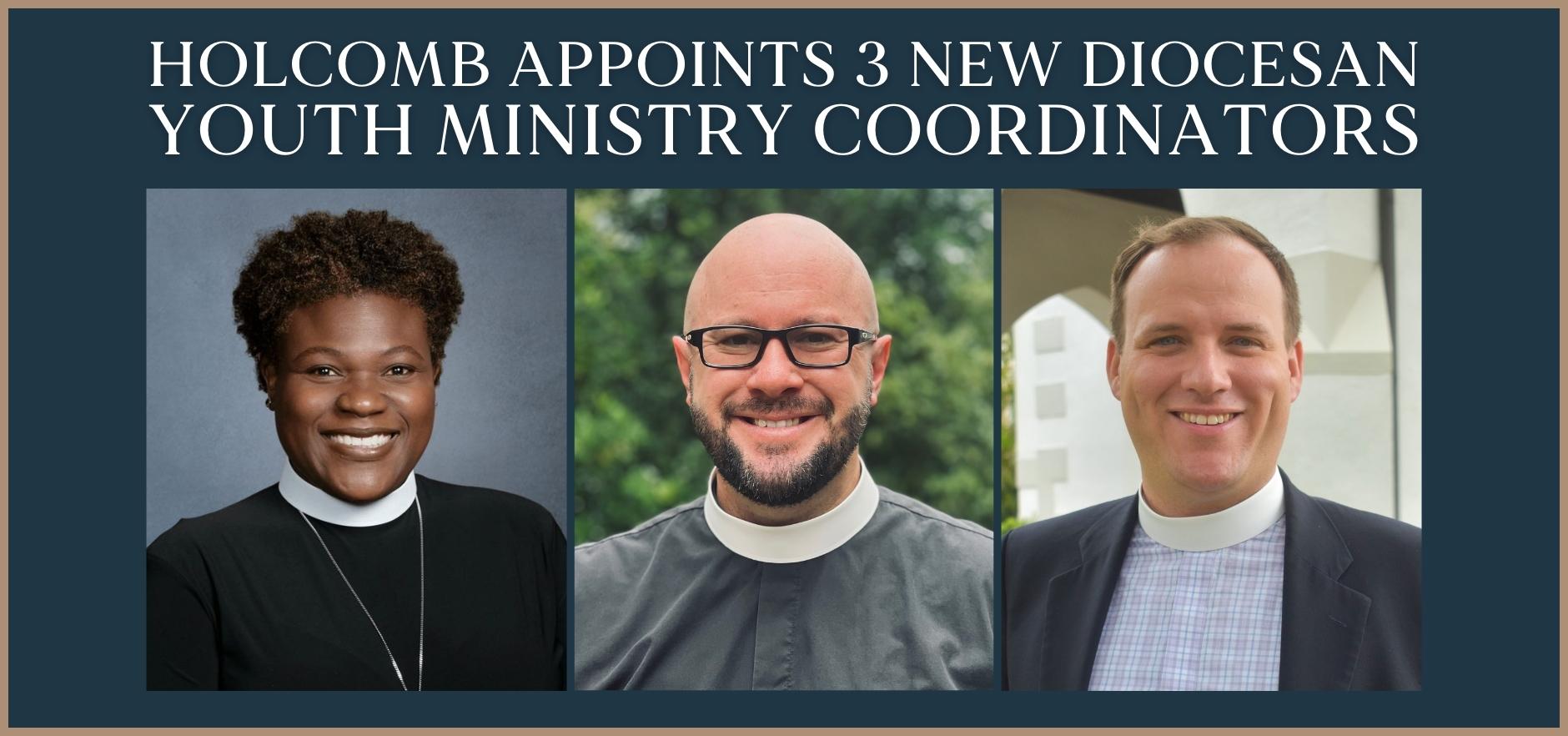The Rt. Rev. Dr. Justin S. Holcomb, bishop of the Diocese of Central Florida, has appointed three priests to serve as diocesan youth ministry coordinators. In addition to their current roles, the Rev. Garcia Barnswell-Schmidt (Lower School chaplain of Holy Trinity Episcopal Academy, Melbourne), the Rev. Kevin Bartle (rector of St. Mary of the Angels, Orlando) and the Rev. Jared Jones (rector-elect of Holy Cross, Sanford), look forward to beginning this new ministry in January 2024. Barnswell-Schmidt, Bartle and Jones bring a wealth of experience and expertise in youth ministry to their new roles.
“Since 2014 when Bishop Brewer contracted with Youth Ministry Institute to provide youth ministry guidance for our diocese, YMI consultants Steve Schneeberger, Kirsten Knox and Brian Lawson have served our churches with excellence and creativity as they helped establish a solid foundation for our work ahead,” Holcomb said in a letter announcing the youth ministry coordinator appointments. “Please join me in expressing heartfelt thanks to Steve, Kirsten and Brian as we take the next step in fulfilling our responsibility to pastor the youth and their families in the Diocese of Central Florida.”
The new youth ministry coordinators will develop a cohesive and comprehensive vision for youth ministry in the diocese. Together they hope to compile the gifts and strengths of student ministry leaders in a way that will provide tangible support, fellowship and resources with a kingdom focus. Barnswell-Schmidt believes that vision will be born from a posture of deep listening.
“We want our youth directors to know the diocese is behind them,” she said. “We want to come alongside them to listen to their ideas, hear their struggles and their hopes, and make their jobs less stressful by providing resources to help them. Spiritual formation of any age is a huge and sacred responsibility, and it can be very stressful for student ministry leaders.”
As leaders who have worked with students for decades, the three youth ministry coordinators know the weight of that responsibility well. Jones believes that internal pressure is what prevents so many churches from taking initial steps in youth ministry.
“I think there is a common misconception that you have to be a cool student pastor to start a ministry for students,” he said. “But the truth is, what they need is to know that their leaders love them and love Jesus. We don’t have to have all the answers. We just need to be willing to spend time with them, pray with them and read the Bible with them.”
The youth ministry coordinators plan to meet regularly with each other throughout the year, but they also plan to travel to be a present resource for churches at each stage of youth ministry, providing ideas, curriculum recommendations and pastoral care to leaders who care for students and their families.
“Our goal is not that we as diocesan youth coordinators do all of the student ministry, but that we support local parishes who are either starting or restarting their ministries and are asking, ‘Where do we go from here?'” Jones said.
While traditionally “youth” has been defined as grades six through 12, Bartle explained that we must expand our understanding of the term. “Youth ministry does not begin in sixth grade, but in Pre-K,” he said. “Each of these stages – children, middle school, high school, college and young adulthood – should not be segmented, but should flow into each other. We want students prepared to be launched into each new stage.”
Jones explained that students are being exposed to adult issues at earlier ages but are experiencing a much longer on-ramp into adulthood. This dichotomy presents a unique challenge, but also an exciting opportunity for churches to partner with parents and students.
“At baptism, the church should come alongside parents, who are the primary preachers of the home,” he said. “Then at confirmation, the church can begin to help students understand how to be Christians on their own.”
“It’s important for us to remember that students are not the church of the future; they are the church of today, and we need to make room for them to participate now,” Bartle said. He experienced that firsthand as he first began serving in the diocese as a teenager. Not only did he attend diocesan youth events, but he also served on committees and teams. That involvement launched him first into youth ministry and then into the priesthood. Barnswell-Schmidt first received a call to ordained ministry while the recipient of student ministries in the diocese. Jones, also the byproduct of student ministries, had a winding road that brought him to this position too.
It is that perspective that will buoy them in their new role.
“Student ministries is a marathon, not a sprint,” said Bartle. “We hope to provide the diocese with the vision and encouragement that is needed for the task of equipping students to have a long-lasting faith and kingdom focus.”

